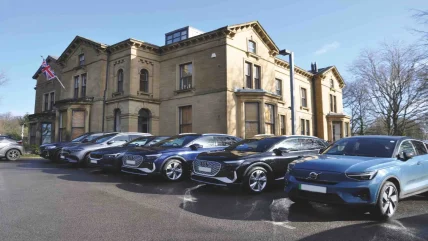
Not many leasing companies can trace their roots back more than 75 years and even fewer have serious motorsport pedigree behind them, but JCT600 does.
The heritage derives from the retail business, which long preceded the leasing arm and operates as a separate entity, but it is a fun back story. The three letters that prefix the company name are the initials of Jack Crossley Tordoff, who took on the family motor dealer business from his dad, Edward, who himself established it as a single garage in Bradford in 1946. It has since mushroomed into one of the UK’s major dealer groups.
Jack’s Mercedes 600 provided the firm’s numerical suffix and bore the number plate ‘JCT600’. He was also a dab hand behind the wheel, and his exploits included winning the 1973 Circuit of Ireland Rally in a 2.7-litre Porsche 911 Carrera, featuring the very same plate.
He died in 2021, but the businesses live on in retail and leasing forms, the latter as JCT600 Vehicle Leasing Solutions (VLS). It does not go back quite as far as the sales arm, but nonetheless has more than three decades behind it, having been established in 1988. The whole caboodle is still owned by the Tordoff family, which has its perks, according to Ben Creswick, who joined the leasing division in 2018 as commercial director and has been at the helm as MD since 2019.
“It’s very, very different to what I have been used to in the private equity world with the likes of Zenith and FMG. They are on a different journey, whereas a family-owned company has a lot of benefits to it.
“If I’d gone into a meeting [at a private equity firm] it might go something like, ‘we are going to do something with this department here and that will save us 200 grand, which will mean we can use that 200 grand to invest over here’. Here, it is very much, ‘that, over there, is actually OK. There are good people there, and they’ve been here a long time. Why don’t we just give you the 200 grand to invest?’ You don’t have to [lose] something over here to do something over there.”
The firm had 6,942 vehicles on its books in 2022 – up 9% year-on-year – so it is far from the biggest leasing firm on the block. Creswick reckons it will comfortably crack 7,000 in 2023, but he is not especially fussed about reaching Lex or LeasePlan levels.
“We don’t want to be the biggest,” he says, “we don’t have some magic number that we’ve got to hit in terms of fleet growth. We’re there to deliver the best possible service to the customers that we have and attract similar companies.”
Its online platform, Origo, was launched in 2020 and is designed to direct companies and drivers to the most appropriate forms of funding in as straightforward a manner as possible. He says even he has been bamboozled by the multitude of tropes and issues in fleet, so the system needed to distil them to a level that could be easily absorbed by non-specialists.
“When I joined the business, I think at that point it was WLTP or some other such issue that we were facing – post-Dieselgate and all that kind of stuff. After being in the accident management world with FMG and coming back to contract hire, I suddenly realised there were more acronyms and things that I just didn’t understand. It seemed to have become more inherently complex, and I said, ‘there must be a system we can create that allows us to provide whatever the right scheme is, at the right time, for the right company, and the driver. And that’s what we built with Origo.”
The system is something akin to a price comparison website for fleet funding, because it is designed to steer companies and drivers towards whatever method makes the most sense. That is increasingly salary sacrifice, which the firm says now accounts for a lot of its current and new business, and it has arguably become a smaller version of the likes of Tusker and Zenith – larger leasing firms known for their emphasis
on salsac.
“Size-wise, we can do small, medium, large corporates,” says Creswick, “we’ve got no constraints there, because the system can roll things out very simply, and we don’t particularly have a target market – it’s just anyone who is looking to launch a salary sacrifice scheme as an employee benefit. They can look at our system, see what it does and how it takes the employee through the journey.
“It’s a modular platform. The implementation team can go into the admin system and just say, ‘right, it’s Joe Bloggs PLC, it’s these 20 employees, this is their policy document with all their respective terms and conditions. It’s been built to provide clarity in quite a complex environment.”
He believes that level of spoon-feeding is useful for seasoned fleets and drivers used to company cars, but it is especially handy – if not essential – for salary sacrifice takers, many of whom are completely unfamiliar with the process.
“I’ve been dealing with salary sacrifice since 2008, when we created the product at Zenith, and it’s not that much different to how it was back then,” he explains, “but it’s how you take those individuals [and] how you communicate with them before the launch of the scheme. How the system takes them through the process, so they understand exactly how the calculation works and what their risks are, is really important.”
Beyond salary sacrifice, the company still does other forms of fleet funding, including run-of-the-mill contract hire, cash allowance, and employee car ownership. The latter is comparatively rare these days but might still suit the odd fleet. As Creswick explains, it was initially set up for one of its larger customers well-pre-pandemic, and still exists for drivers who fit the profile, but the better returns offered by salsac, plus a general reduction in business mileage, means many drivers are better off switching.
“It [employee car ownership] is based on a credit sale agreement,” he says, “it’s old-school eco – if you can remember old-school eco schemes. That product is very much driven, excuse the pun, by business mileage. It tends to deliver the most value where you’ve got high business mileage users – and that business [the customer for which it was established] has quite a lot of those.
“This is not a specific example, but if you go back before Covid and look at the same business, employee car ownership works amazingly well. It’s a very, very cost-effective product for both the driver and the corporate. Fast-forward to today, and quite a lot of those drivers aren’t doing the same mileage that they were, because Covid has changed things, so you’ve got to have the ability to flex your scheme.”
That involves pulling drivers out of such schemes and dropping them into an alternative if they now spend more time on Teams and Zoom than on the motorway – but sticking with them for those whose mileage justifies it.
“You might say, ‘actually, we are going to increase the minimum number of business miles that an employee has to do for them to be eligible for that scheme’,” explains Creswick, “for those that aren’t doing that mileage anymore, we’ll run contract hire side-by-side, and the system [Origo] will identify which is the most cost-effective for the individual and the corporate.”
Creswick is bullish about the company’s outlook for the rest of the year. Its accounts for 2022 had not been published at the time of writing, but the aforementioned uptick in leased vehicles bodes well, while its latest statement on Companies House showed a year-on-year increase in profit before tax of £1.4m to £5.4m.
He freely acknowledges the economic turmoil from every direction, but says he has, “never experienced a period where it’s just been just stable. In 2001, there were changes to company car tax and people were taking cash, then there was the recession/financial crisis in ’08/’09. I get that bad news sells to an extent, but you can’t get too bogged down with all those things.”
He also reckons residual values will remain reasonably strong for the foreseeable future. A portion of the company’s 2021 performance was attributed to the strength of used car prices, and it cited a 7.1% increase in vehicle disposal income. Values have since softened a little – although they have hardly tanked – and Creswick says second-hand car prices have been key to balancing the company’s books amid the now-easing new vehicle shortages.
“Let’s say you made a grand a vehicle when it [the car] came back, but now you are making two grand. If half as many vehicles come back than you have budgeted for, you’ve still made your money back.
“The used car market is not in our control, but it’s certainly helped us keep our numbers where they need to be, and we don’t think there’s a cliff edge there. The market is strong, and we think that will continue well into the year.”





